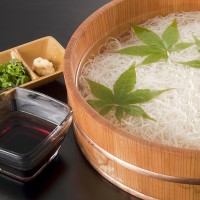blog
Tuesday: Nihon-no Kotowaza
07/28/2015 blog
Taigi-wa Taigo-no Moto (大疑は大悟の基) (Great Doubt) [Vocaburary] Taigi (大疑・たいぎ): Great Doubt – having a big doubt Taigo (大悟・たいご): Great Enlightenment – getting enlightened/realizing something very important Moto (基・もと): Basis [Translation] Great doubt is the beginning of great enlightenment. [Comment] You are encouraged to have a big doubt about something that seems important. Keep working on that until what you have thought about becomes crystal clear to you. That is the moment when you are really enlightened to the next level.
Monday: One Point Nihongo Clinic
07/28/2015 blog
Shirtsureishimasu (しつれいします) <2> Traditionally, the Japanese believe that you cannot go home before your boss. Simply it is rude for you to do so. However, if you dare to say, “Shitsureishimasu (しつれいします)” and take off, you can unless you signed the contract, which says that you will stay until you get your job done. (Overtime, unless you get paid extra for the work, is not welcome.) In this case, “Shitsureishimasu” means “I am sorry to DISTURB or BOTHER you by going home when you can’t.” Mostly, “Shitsureishimasu” follows the word, “Osakini,” which means “before you (go home).” Especially, it is your boss or your supervisor that is left behind working, rookies are …
Monday: One Point Nihongo Clinic
07/28/2015 blog
Shirtsureishimasu (しつれいします) <1> (You say, “Shitsureishimasu” before entering a Teachers’ Room in Japan.) Every school in Japan has a “Teachers’ Room” called “Shokuin Shitsu (しょくいんしつ). This is NOT equivalent to “Teachers’ Lounge” in US. Teachers’ lounges are where teachers take a break as you know it. On the contrary, Japanese “Shokuin Shitsu” are where teachers prepare for their classes. American teachers are not paid for the time they are in the lounges while Japanese teachers are. This difference comes from how schools are operated – American teachers go straight to thier class rooms where they are in charge or to the special rooms, such as science rooms, art studios, or music …
Saturday: ナバホインディアンのくにへ #8
07/26/2015 blog
<つづき> チャプターハウスとよばれるにほんでいうなら、ちいきごとのこうみんかんのようなたてものがある。ここにも、なぜか、がっしゅうこくっきがたなびいている。このたてものは、チャプターハウスごとにもうけられるぎかいじょう(ぶぞくせいふがそんざいするから、ぎいんもそんざいする。)であり、しゃこうのばであり、としよりにとっては、ふくしサービスをうけるばである。 (チャプターハウスのやくわりはおおきい)
Saturday: ナバホインディアンのくにへ #7
07/26/2015 blog
<つづき> (コードトーカーのしゃしんをさつえいするかわのし) ぶぞくのしょうがくきん(うらんこうなど、とちのロイヤルティがそのおもなざいげん)をもらえるこどもたちもいるが、これでだいがく(ほりゅちがい)ににゅうがくしてもちゅうとたいがくしゃがおおい。というのも、かれらはいちどにまとまったたいきんをてにするとそのしとがわからず、ぜんがくつかってしまってやちんをはらえなくなる。りょうしんにたよろうとしても、かねなどいえにあるはずはなく、しごともなく、いえでさけをのんでいたりする。いっぽう、しょうがくきんをやくだてることにせいこうしたもののはんすういじょうは、ほりゅうちないにもどり、きょうしょくについている。とくにきんねん、しょうがっこうれべる(ナバホごもおしえる)では、ナバホぞくしゅっしんしゃのきょうしのかずがふえてきている。ちゅうがくれべるいじょうになると、はくじんのきょうしのかずがおおくなる。ナバホぞくしゅっしんのいしゃぶそくはおおきなもんだいである。 いんしゅは、ほかのネイティブアメリカンとどうよう、しんこくなしゃかいもんだいである。やすざけもてにはいらないときには、すぷれーかんにてをくわえてさけのかわりにする。いんしゅがげんいんのじこおよびはんざいはあとをたたない。 (アルコール依存症) <#8につづく>
Saturday: ナバホインディアンのくにへ #6
07/26/2015 blog
1995ねん2がつふつか (かわのけんじし) 「ナバホぞくのじょせいとけっこんし、このほりゅうちにすみついて、しゃしんをとりつづけているにほんじんがいる」ときいて、さっそくれんらくをとる。かれのなまえは、かわのけんじし。いかは、かれからおそわったこと。 (しゃしんてんにて。ナバホコードトーカーのおひとりと。) ナバホネイション(かれらはじぶんたちのほりゅうちをこうよぶ)のバスは、いちにちににかいくらいしかうんこうしていない。「かしきり」じょうたいになるときいがいでも、いつもひとりかふたりしかのっていない。こうりつがわるすぎる。こがたのバスにして、なんどもおうふくさせればきゃくもあつまるだろう。わたしもどうかん。 (べつのこてんにて) <#7につづく>
Saturday: ナバホインディアンのくにへ #5
07/25/2015 blog
1995ねん2がつついたち グレイスのいったとおり、ほりゅうちではぶっかがたかい。たとえば、コインランドリーでは、せんざいに50セント、せんたくに50セント、かんそうきに25セント、まいかいかかる(アリゾナしゅうのほりゅうちがいとくらべるとかなり-1わり5ぶていど-わりだか)。 しょくりょうひんてんになると、もっとこのかくさはひどくなり、しなびたリンゴが1こ50セントもするのにいちじるしくまずい。ほかのものにかんしても、すべてがこのちょうしで、パンもスミスやフライズでは99セントのものが、2ドルちかくもする。しょくひんは、だいたいしかの2ばい、くだものやせいせんしょくひんにかんしては3ばいといったところか。せんどがおちるのも、おそろしくぶっかがたかいのも、ここがていしょとくちいきであるだけ、よけいつうせつにかんじられる。 はやくじどうしゃのうんてんめんきょをとって、ぐれいすのははおや(ここからくるまで30ぷんくらいのところにすむ)に、くだものをかってとどけてあげたい。グレイスはたまにしかほりゅうちにはもどってこないから。
Saturday: ナバホインディアンのくにへ #4
07/25/2015 blog
1995ねん1がつ31日 ナバホごをすこしならう。ツーソンでのだいがくいんせいじだい、ぜんじゅつのグレイスのおしえでかじったことはあったが、やはりしなん(とくにはつおん)のげんごである。 「とうざいなんぼく」のいいかたなど、スティーブについてれんしゅうしたものの、ほとんどまともにはつおんできず。 モノにするにはそうとうじかんがかかりそうだ。
Friday: Kojiki (「乞食」ではなく『古事記』ですヨ!!) #22-2
07/24/2015 blog
Konohanasakuyabime (このはなさくやびめ) <2> (Konohanasakuyabime) A while after their marriage, Konohanasakuyabime (このはなさくやびめ) came to her husband, Ninigi-no Mikoto (ににぎのみこと), to tell him something very important. “I am expecting your babies. This is so important to both of us that I decided to tell you.” Ninigi doubtfully said, “You must be kidding, Sakuyabime. You cannot have gotten pregnant after having only one intercourse with me. There must be someone among the Earthly Gods that is the baby’s real father!” Sakuyabime, terribly disappointed in her husband’s comment, boldly said, “I hereby swear that I will be burnt to death if this baby is someone else’s and that I will safely deliver this baby …
Friday: Kojiki (「乞食」ではなく『古事記』ですヨ!!) #22-1
07/24/2015 blog
Konohanasakuyabime (このはなさくやびめ)<1> (Konohanasakuyabime) One day, Ninigi-no Mikoto (ににぎのみこと) met a rare beauty at Kasasano Misaki (かささのみさき). Ninigi fell in love with the beauty at the first glance. Ninigi asked her who her father was. She replied that she was a daughter of Ooyamatsumi-no Kami (おおやまつみのかみ). She also told him that her name was Konohanasakuyabime or Kamuatatuhime (かむあたつひめ). Ninigi asked if she had her siblings. She told him that she had a sister called Iwanagahime (いわながひめ). Ninigi immediately courted her. Konohana told him that Ninigi should ask her father for the permission. Ninigi sent his messenger to Ooyamatsumi right away. Ooyamatsumi was delighted in Ninigi’s proposal so much that he even …
Thursday: Japanese Food (日本の食べ物)
07/24/2015 blog
Soomen (そうめん) and Zarusoba (ざるそば) Popular Summer Dish – Noodle Soomen: <https://en.wikipedia.org/wiki/S%C5%8Dmen> (Typical Soomen Noodle Served Cold in Summer) Soomen (素麺/そうめん) is a name of the kind of very thin noodle, but the dish itself is called Soomen. No Japanese has Soomen in winter. This is definately a summer item, which is cooked at home or served at traditional Japanese restaurants. Usually, it is made of flour and its color is white like the one in the picture above. At table, Soomen is served with special dipping sauce called Soomen Tsuyu (つゆ). Since Soomen noodle is so simple, people tend to add some additional flavor mixed with the needle itself or …
Thursday: Japanese Food (日本の食べ物)
07/23/2015 blog
Fugu (ふぐ)/Pufferfish <https://en.wikipedia.org/wiki/Fugu> (Fugu swimming in a tank – Ready to be cooked) (Fugu chopped up to be served as individual menus) (Sashimi/Sliced Fugu Meat called Tessa) (Fugu Hotpot called Tecchiri) (Deepfried Fugu called Fugu Karaage) (Grilled Row with Salt called Shirako) (Pickled Fugu Skin called Fugu Kawa) As you may know it, some parts of Fugu (ふぐ) contain high amount of toxin, you need to get a license to cook Fugu in Japan. As a matter of fact, a fair number of people get killed because of Fugu poison every year. I strongly recommend you should eat Fugu cuisines cooked only by professionals with particular license. Fugu cuisines are seasonal. …
Wednesday: Nihon-no Manga (日本の漫画)
07/22/2015 blog
Tensai Bakabon (天才バカボン) (https://en.wikipedia.org/wiki/Tensai_Bakabon) This is the most nonsense manga (まんが)/cartoon in the world! “Tensai Bakabon (てんさいバカボン)” appeared in one of the most popular boys’ magazines in 1967. A TV show called “Tensai Bazkabon” started in 1971 and lasted for such a long time, including reruns, that the boys who watched those episodes grew up to watch a new series of “Tensai Bakabon” with his sons. Girls, who tend to be maturer and more rational than boys, didn’t like this original manga or TV show very much. This manga is all about one special family of four – Bakabon (an older son of this family), Hajime (a …
Tuesday: Nihon-no Kotowaza
07/21/2015 blog
Tatsu Tori Ato-wo Nigosazu (立つ鳥跡を濁さず) [Vocaburary] Tatsu (立つ/たつ): Leaving Tori (鳥/とり): Birds Ato (跡/あと): Marks; Traces; Evidence Nigosazu (濁さず/にごさず): Not soiling; Not leaving stains behind [Literal Translation] Even birds clean up their mess before they leave. [Translation] It is an ill bird that fouls its own nest. [Comment] In Japanese, the word, Tatsu (Leaving), can be interpreted in many ways, such as “taking off,” “start out new,” “moving to another job or place,” “leaving this world,” and so on. So, this proverb teaches you to “clean up the mess you made so you wouldn’t look back and regret about it before you leave.” Very traditional Japanese way to live.
Tuesday: Nihon-no Kotowaza
07/21/2015 blog
Goo-ni Ittewa Goo-ni Shitagae (「郷に入っては郷に従え」) [Vocaburary] Goo (郷/ごう): the country; a district; a village Ittewa > Iru (入っては/いっては): When you are in ~ Shitagae (従え/したがえ): observe; obey; abide by; conform to; act upon [Translation] When you are at [in] Rome, do as Rome does [the Romans do].


















